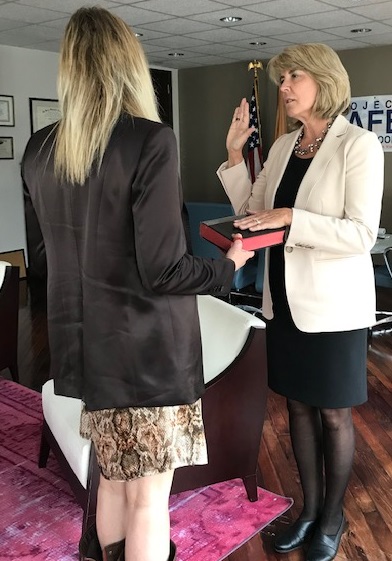Archival Notice
This is an archive page that is no longer being updated. It may contain outdated information and links may no longer function as originally intended.
In March, the Office of Sex Offender Sentencing, Monitoring, Apprehending, Registering, and Tracking welcomed a new Director, Kendel Ehrlich. She previously served as the Deputy Director of the White House's Office of National Drug Control Policy. In that position, Kendel specialized in external communications combatting the opioid crisis with particular emphasis on ONDCP's High-Intensity Drug Trafficking Areas and Drug-Free Communities programs.
Prior to joining the federal government, Kendel was a prosecutor in Annapolis, Maryland, managing a drug court team that provided alternative, long-term drug treatment in lieu of incarceration. She has extensive criminal justice experience as a district court and juvenile court prosecutor as well as a public defender. She also has a strong leadership and political background: As First Lady of the State of Maryland from 2003 to 2007, she represented the state, speaking extensively on initiatives such as education, drug and alcohol abuse prevention, domestic violence prevention and cancer prevention. She also co-hosted a weekly radio show from 2007 to 2010. Kendel and her husband, former Maryland Governor Bob Ehrlich, have two sons, ages 20 and 16, and enjoy watching them play football, basketball and baseball.
"I'm excited about leading the SMART Office and working with states, tribes and territories to implement and maintain the requirements of the Sex Offender Registration and Notification Act," Director Ehrlich said. "Registering and tracking sex offenders is a key component to communities' efforts to protect their citizens and advance public safety, especially during such trying times as the COVID-19 pandemic."
April is Sexual Assault Awareness Month. While we are rightfully focused on health issues regarding COVID-19 and our children are home, remember to be aware of who your children may be communicating with on their computers and mobile devices, and what they are viewing. Continue to discuss safety precautions with them. For age-appropriate videos and activities for children to learn about online safety, visit NetSmartzKids.org, the online safety education program from the National Center for Missing & Exploited Children. To check for sex offenders in your neighborhood, you can visit the Dru Sjodin National Sex Offender Public Website at NSOPW.gov, or download the app to your mobile device. NSOPW.gov also has safety and education information to help you prevent abuse and identify and respond to it. The safety precautions you take now may prevent a lifetime of trauma. Stay safe.



